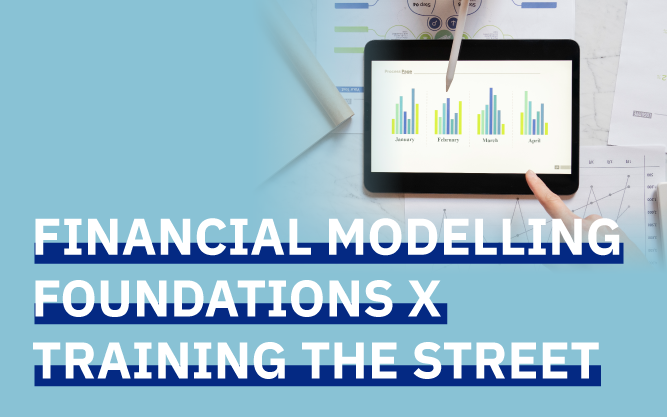Course Overview:
For junior finance professionals
Enhance your team’s skills and drive business performance
In today’s financial environment, having a competitive advantage requires the knowledge, skills and developed competencies ready to meet your client’s needs. Training The Street (TTS) meets that need.
We have tailored the Financial Modeling Foundations Program to give your employees the skills needed to excel in financial statement analysis, financial modelling, and valuation.
Our trainers have the first-hand experience of investment banking, and the diversity of our team reflects the regions, sectors, subject areas, languages, and cultures with which we work.
Course objectives:
Upon the completion of this course, the participant will be able to:
- Develop advanced Excel skills required for creating, formatting, and manipulating financial models effectively.
- Learn to interpret and analyze financial statements, including income statements, balance sheets, and cash flow statements, to assess a company's financial health.
- Master various forecasting methods to project financial statements, revenue, expenses, and other key financial metrics for informed decision-making.
- Gain the ability to create dynamic and interconnected financial models that update automatically when input variables change.
- Explore different valuation techniques such as discounted cash flow (DCF) analysis, comparable company analysis (CCA), and precedent transaction analysis to determine the value of a business or investment opportunity.
- Understand how to perform sensitivity analysis and scenario analysis to assess the impact of various factors on financial outcomes and model robustness.
- Learn how to evaluate capital investment opportunities by applying relevant financial metrics such as net present value (NPV) and internal rate of return (IRR).
- Discover methods for identifying, assessing, and mitigating financial risks within models, and understand the implications of risk on decision-making.
Delivery Method:
Face to face in QFBA Tower.
Target Audience:
- New hires who have joined the firm late and missed the in-house program
- Experienced bankers looking to refresh their technical skills
- Teams employed in financial strategy roles from non- banking corporations
- Graduates preparing to interview for a role in the finance sector
- Students at business school and looking for a career in finance
Course Contents:
Financial Statement Analysis Bootcamp (1-day)
In this session participants will cover the income statement, balance sheet and cash flow statement given a series of transactions. Most importantly, the key interactions between the income statement and balance sheet are covered in detail.
Financial Modeling – Fundamentals (2-days)
Participants will learn how to build a three-statement integrated financial model and review the structure and key components of an integrated three statement forecast model.
Valuation Fundamentals and Trading Comparables (1-day)
Participants will build a solid understanding of corporate valuation in the context of investment banking. The four key valuation methodologies will be introduced:
- Trading comparables analysis
- Discounted cash flow analysis
- Transaction comparable analysis
- LBO analysis
DCF Valuation (1-day)
Participants will learn how to build a discounted cash flow valuation model. The session starts with an overview of the valuation methodology, and the steps required in setting up a valuation model. We then focus on the calculation of free cash flow.









